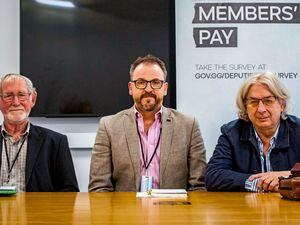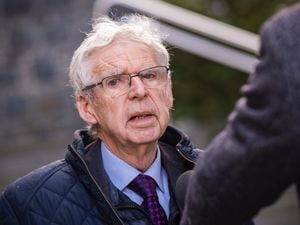Move towards open skies given positive response
A POSITIVE reception was given to discussion of how Guernsey’s air market is moving towards an open skies policy at yesterday’s Institute of Directors’ lunchtime seminar.

At the heart of the change will be the implementation of public service obligations in place of the current air licensing system, which will mean an end to the ‘quite restrictive’ mechanism which controls which operators can operate which route, said Economic Development president Charles Parkinson.
The department was working on its plans, and hoped to bring a report to the States in the autumn.
Policy & Resources vice-president Lyndon Trott added that by June there would be ‘a lot of documentation’ published on the issue.
The panel of four also included Blue Islands’ chief commercial officer Tom Barrasin and Aurigny chairman Andrew Haining.
The four men took questions from the floor during the seminar, as well as fielding points raised by moderator James Ede-Golightly.
One issue raised was why airlines did not offer cheaper seats on flights that were traditionally under-utilised, such as those to regional airports during the middle of the day.
Simply reducing the price of a seat would not necessarily lead to a rise in passengers, said Mr Haining.
A graph had been displayed that showed how air passenger figures had fallen in Guernsey since 2010, but risen in Jersey,
But while the number of flights taken by people aged 18-65 had remained relatively static at about 10 per person, said Mr Haining, Jersey’s 18-65 population had risen to about 85,000 and a key factor in that was an increase in the number of people who were not brought up in the island.
‘By and large that was what has fuelled growth,’ he said.
Mr Barrasin echoed these comments, and said that in Blue Islands’ experience Jersey had more growth potential.
The overall point was made that unless it was possible to make people in Guernsey travel more, the trend was likely to continue.
However, he said later that simply taking away bureaucracy did not mean it made sense for a particular operator to look to operate on a given route.
‘The licensing regime as it stands is not the primary factor for why we are not seeing more UK airports opening up,’ he said.
The change to PSOs ‘will not have a huge impact on our services because the numbers that do exist are marginal at best’.
Mr Haining said that the deregulation of all routes had to be looked at very carefully.
Deputy Trott said more than once during the seminar that the key issue of the States owning Aurigny was strategic rather than commercial.
Some routes were classed as lifeline, while some were for economic enablement purposes and those were more likely to have government subsidies as a result of the PSO, he said.
‘In a matter of weeks we will know what routes Economic Development consider to be of strategic importance and what PSOs will be,' he said.
‘The States of Guernsey bought Aurigny and sustains Aurigny simply because it wants to ensure there are a good range of connections with the island,’ added Deputy Parkinson.
‘But at this stage I don’t think it would be sensible for the States of Guernsey to go to the market and say “Here’s a pot of money, who would like to operate these services?”,’ he said.





